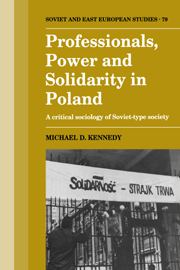Book contents
- Frontmatter
- Contents
- List of tables
- Acknowledgments
- List of abbreviations
- Introduction
- PART I SOLIDARITY AND SOCIAL TRANSFORMATION
- 1 The historical genealogy of Solidarity
- 2 The nature and causes of Solidarity
- 3 The Solidarity movement as emancipatory praxis
- PART II SOLIDARITY AND THE THEORY OF SOVIET-TYPE SOCIETY
- PART III PROFESSIONALS AND SOLIDARITY
- PART IV CONCLUSION
- Notes
- References
- Index
- Soviet and East European Studies
2 - The nature and causes of Solidarity
Published online by Cambridge University Press: 22 September 2009
- Frontmatter
- Contents
- List of tables
- Acknowledgments
- List of abbreviations
- Introduction
- PART I SOLIDARITY AND SOCIAL TRANSFORMATION
- 1 The historical genealogy of Solidarity
- 2 The nature and causes of Solidarity
- 3 The Solidarity movement as emancipatory praxis
- PART II SOLIDARITY AND THE THEORY OF SOVIET-TYPE SOCIETY
- PART III PROFESSIONALS AND SOLIDARITY
- PART IV CONCLUSION
- Notes
- References
- Index
- Soviet and East European Studies
Summary
The Solidarity movement of 1980–81 was an organized attempt by over 9 million people to transform the structures that organize Polish life. In chapter 3, I argue that Solidarity is best understood as a form of “emancipatory praxis.” In this chapter, I consider how other authors have conceptualized this movement, and how they have explained its emergence. I begin with a discussion of the immediate conditions which led to Solidarity's formation. What characterized the strikes of 1980 and how did they lead to the formation of an independent trade union? In the next section, I turn to the more abstract structural features which called those immediate conditions into play. In particular, I consider the economic, social and cultural features structuring Polish life at the end of the 1970s. Then I turn to a more agent-centered account of the 500 days of Solidarity in order to derive its “meaning.” Here, the understandings activists had of their movement are considered. Finally, I consider those approaches which try to link structure and action more directly. In particular, I examine Marxist and resource mobilization accounts of Solidarity.
The immediate conditions of Solidarity
Most observers agree that without drastic economic decline, Solidarity would never have formed. This assumption of course implies that “compensatory” needs (Bahro, 1978) can live up to their name. Had the Polish economy been able to continue its boom of the first half of the 1970s, Solidarity would never have formed. Poland's consumerism would not have been “premature” (Pravda, 1982).
- Type
- Chapter
- Information
- Professionals, Power and Solidarity in PolandA Critical Sociology of Soviet-Type Society, pp. 49 - 83Publisher: Cambridge University PressPrint publication year: 1991

